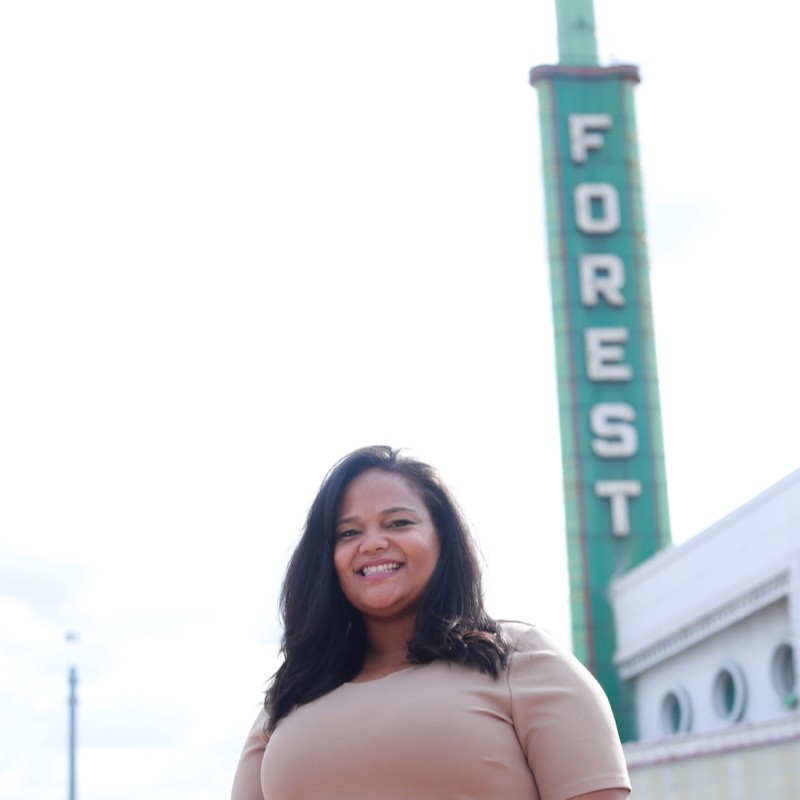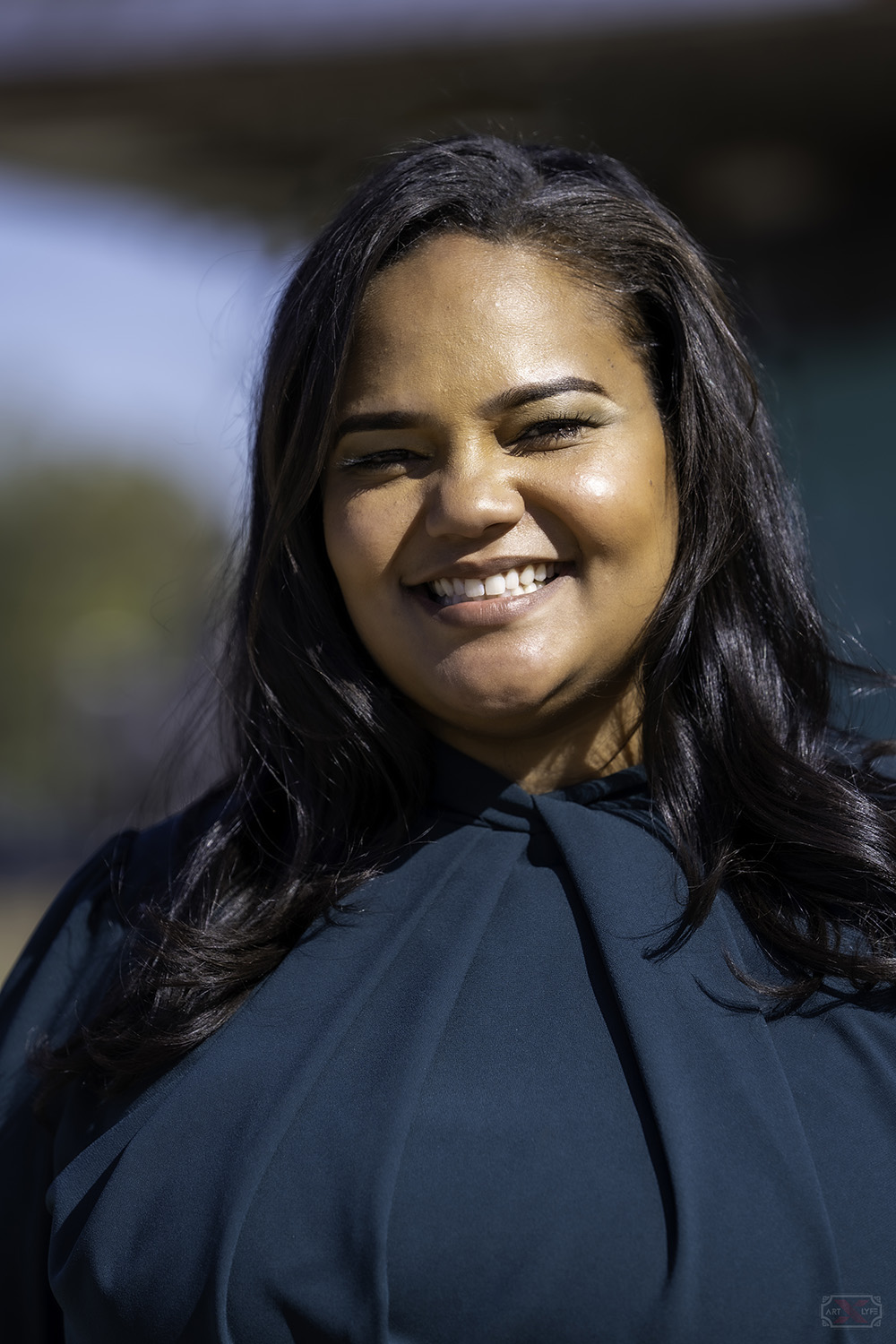Story by Jennie Trejo. Photos provided by Forest Forward.
When Elizabeth Wattley’s father was six years old, he saw Imitation of Life at the Forest Forward Theater in South Dallas. It was 1959, so he was forced to sit on the balcony because the theater’s policy segregated people of color to the upper levels. Today, Elizabeth is the President and CEO of Forest Forward, the nonprofit that owns the theater and is working to revitalize it.

“Everything comes full circle,” Elizabeth says. “Our family’s story adds a personal layer. It means a lot to bring something back to the community that can be welcomed.”
Elizabeth was born and raised in the Southern sector of the city, specifically the Cedar Crest neighborhood of Oak Cliff, which is “right on the other side of the bridge of South Dallas.” She attended church with her family every Sunday in South Dallas, swam at Exline Recreation Center, and was even taught by Erykah Badu at the South Dallas Cultural Center as a child.
When you trace the neighborhood’s history, you find that Cedar Crest had primarily wealthy white residents until the 1950s, when Black professionals began to move in and fight for the local schools and community desegregation. Through the ‘60s and ‘70s, it was one of the limited number of places where African Americans could purchase homes. Elizabeth’s family home can still be found there today.
South Dallas follows a similar journey line. What began as a bustling metropolitan area eventually shifted as the construction of S.M. Wright (State Highway 175) began, causing the demolition of more than 1,300 homes and splitting the neighborhood. White flight, segregated housing policies, and historical disinvestment settled in.
Though the audience and purpose of the theater have changed over time, one thing has remained true: Forest Theater has long been a cultural symbol in the city’s Southern sector. According to the Forest Forward website, “Forest Theater became a mecca for art, music, and community gatherings.”
“People have pre-existing relationships with this theater,” Elizabeth explains. “People come up to me all the telling me stories of, ‘I had my first kiss here. I saw Prince here. I met my wife here.’ People want to see this project happen.”
While Elizabeth is too young to have enjoyed the theater in its prime, she says her experience being raised in South Dallas and surrounding neighborhoods has personally inspired her to want to see the the day that the theater’s lights shine bright again.

In the ‘90s, when Elizabeth was going to school, she attended Dallas ISD’s George Bannerman Dealy Montessori Academy, a magnet campus in Preston Hollow.
“I’m a Dealey Dragon. I was part of the busing system when they were trying to get students from the southern sector up north,” Elizabeth explains. “So I thought it was normal for every kid to get up at 5 a.m. and catch the bus north because that’s what I did.”
From there, Elizabeth attended Bishop Dunne Catholic School for high school, which eventually led her to Spelman College in Atlanta– “the number one historically Black college and university in the country for the past 17 years,” Elizabeth reminds us with a smile.
After graduating from Spelman in 2006, Elizabeth worked a brief stint in accounting before she was “bit the bug” for social entrepreneurship and neighborhood revitalization.
“I realized that I’m not meant to be behind a computer every day,” Elizabeth says. “So I went to work at Paul Quinn College.”
At Paul Quinn, Elizabeth ran student affairs and eventually became the Director of Service Learning. Her experience was not traditional, though.
“I transformed their football field into an organic farm,” Elizabeth says.
In 2008, the football field at the university stood unused. Elizabeth led an effort to turn it into a nationally recognized organic farm to combat food inequities and create more access for people living nearby.
“I realized we could address these social issues using business principles and practices,” Elizabeth explains.
 Deciding to go back to school, Elizabeth enrolled for her MBA at the Cox School of Business at Southern Methodist University. Her next gig was at CitySquare as the Director of Strategic Initiatives. There, she spearheaded innovative social entrepreneurship projects, which included building 50 cottages for chronically homeless individuals on Malcolm X Boulevard.
Deciding to go back to school, Elizabeth enrolled for her MBA at the Cox School of Business at Southern Methodist University. Her next gig was at CitySquare as the Director of Strategic Initiatives. There, she spearheaded innovative social entrepreneurship projects, which included building 50 cottages for chronically homeless individuals on Malcolm X Boulevard.
While Elizabeth was working at CitySquare, she was also introduced to the restoration efforts at Forest Theater. In 2020, she decided to branch off and filed a 501(c)3 for what became Forest Forward, the nonprofit dedicated to the project.
Elizabeth credits her mother– Cheryl Wattley, one of the leading criminal defense attorneys in the City of Dallas– as the person who gave her “the bug.”
“I always would witness and not even know that I was watching her fight for the underdog, for the person who was swallowed into the legal system, and see how they get help and support,” Elizabeth says. “I got to see my mother work in the City of Dallas and bring the very best forward.”
She also gives credit to her father, an entrepreneur and a leader in his own right.
“My dad is a South Dallas native; he grew up on Reed Lane. The whole family is anchored there. So I was able to bring those together and be a little scrappy around it.”
Elizabeth has had to get scrappy. Her current project, the restoration of the Forest Theater, comes with a fundraising tag of over $75 million. The theater, which has sat shuttered for decades, has seen unsuccessful revitalization efforts in the past.
“The most rewarding thing to date has been people believing in the work that’s happening,” Elizabeth says. “Believing that this organization can bring the Forest Theater back to life. I’m very aware that we would not have made it this far without the community’s support and backing. So it just means a lot to us.”
Elizabeth says that she refers to the South Dallas community specifically, because “you’re not going to get too far out the gate without them saying ‘Yes, we support this work.’” But she certainly cannot leave out the City of Dallas, both their residents and the entity, for their support as well.
“I’m now learning how all these pieces and intricacies work together,” Elizabeth elaborates. “We’re also working with the City and our council representative on infrastructure improvements.”
In addition to the theater itself, Forest Forward is partnering with Dallas ISD to reopen the Dr. Martin Luther King, Jr. Arts Academy down the block.
“It is going to be for kids pre-K to 8th grade,” Elizabeth explains. “Just being a part of that and recognizing the monumental value that it brings is exciting.”
Elizabeth and her team are scheduled to complete construction by the end of 2025 and have a groundbreaking ceremony planned for December 2024.
“I just wait for the day to see the marquee tower at the Forest Theater light up in order to actually shine like the beacon that it is,” Elizabeth says. “And so that day is coming. We’re going to keep fighting for it.”
If you would like to learn more about Elizabeth and Forest Forward, you can visit their website here. Elizabeth says one of the best ways to get involved is to help share their story so people can continue to be ambassadors around the work and share in the joy it will bring to the community.
Sign up with your email address to receive good stories, events, and volunteer opportunities in your inbox.